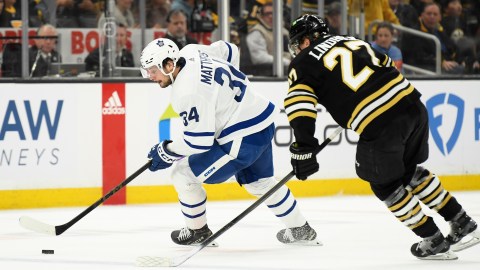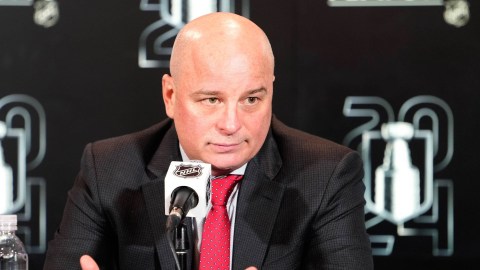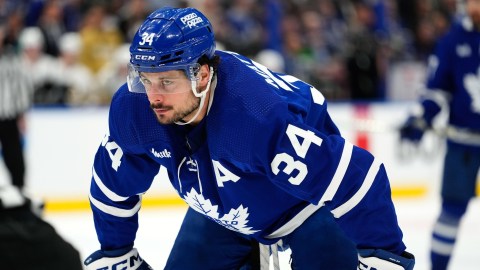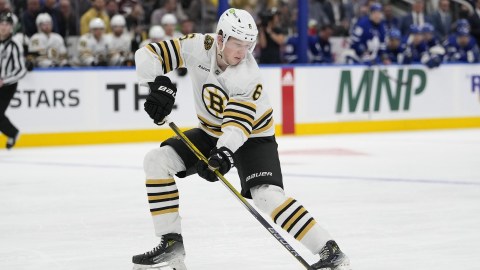Those who slept through history class are doomed to repeat it. Just consider the last chief executive of the United States.
The Bruins have eyes wide open as they approach their first-round
series redux with the Montreal Canadiens. One year ago, the B’s were
the eighth seed, and the Habs were No. 1. Montreal had dominated the
regular-season series, winning all eight games. Then the Bruins went
out and pushed the Canadiens to the full seven games before succumbing.
Philly
finished Montreal in the second round.
Here are five key questions heading into this year’s Bruins-Canadiens matchup.
1. Does regular-season dominance matter?
It does if the dominating team can continue to play to its strengths.
In the regular season of 2008, Montreal’s “X factor,” the asset that no
team could match, was its imperious power play. The Canadiens used
their team speed to put opponents in compromising positions to draw
penalties (many of them with cleverness and guile, taking advantage of
non-damaging stick fouls, etc.). They would toss the puck around as if
it was the youngest sibling’s favorite stuffy at bedtime, keeping it
just out of reach and securely in their possession, torturing their
pursuers before lighting the lamp to their delight. They were showy,
arrogant and almost unstoppable.
But in the playoffs, the Bruins were selectively more aggressive at hunting the puck, denying Alex Kovalev
the access and luxury of time that he so craved. That brought the Kings
with the 24 Rings down to Earth, where the Bruins — with more dirt
under their fingernails — outworked them for the better parts of Games
2 through 6.
Spin forward to today, and Boston is coming off a 5-0-1 regular
season against Montreal, the B’s are No. 1 and the Habs are seeded
eighth. That’s good enough to qualify and start a series at 0-0. If
Montreal can tip the tables by playing strongly enough to its true
strengths, it will prove a very difficult opponent for the Bruins.
Regular season dominance is background. Background neither scores goals nor stops them. It only serves as the prologue.
2. Who has the better goaltending?
It isn’t about numbers. It’s about the goalie who makes the bigger
saves at the more important moments and who lifts his team to a higher
level.
The Carey Price of last spring — so patient, quiet
but efficient in his movements, reading the play with calm
self-assuredness, and using his stick deftly — has gone on hiatus. Few
think that Price’s potential has vanished, but he clearly has regressed
from the form he showed a year ago. He seems overaggressive at times,
less certain when playing the puck, and completely out of sorts on
occasion.
Of course, it’s possible that one of the ghosts who used to inhabit the Forum will snap his fingers, and Price will channel Patrick Roy and Ken Dryden, and there’ll be a parade down St. Catherine’s Street in June. But nobody of the real world is predicting that.
Tim Thomas, meanwhile, has been the best goalie in the NHL this season.
Thomas’ greatest attribute is his competitiveness, and now he gets to
compete with the East’s best team in front of him. Learning from, and
building upon, the lessons of last spring’s first-round ouster, Thomas
has given the Bruins plenty of reasons to believe that he will be at
his best at the biggest moments ahead.
3. Who’s healthier, and how deep are these two teams?
Boston’s captain, Zdeno Chara, hasn’t played since game No. 80 against Montreal. Chara winced after hammering Alex Tanguay
on the first shift and going down awkwardly in the corner to the left
of the Bruins’ goal. He played very well the rest of the night, and
while he traveled with the team and skated hard Saturday and Sunday,
his absence was a bit ominous. He certainly will play in Game 1, but
Montreal will target the B’s most valuable player.
Chara is the single most crucial asset in the matchup between these
two teams. His presence alters every equation. His absence would change
the balance of power.
Patrice Bergeron had his best game of ‘08-‘09 in
the season-series finale against Montreal, scoring the first goal and
setting up two others, including the overtime game-winner by Mark Recchi.
Bergeron also had to leave the ice after blocking a shot during the
second period, conducted postgame interviews while still wearing his
right skate, and didn’t accompany the team on its road trip through
Buffalo and Long Island to finish the regular season. If Bergeron
cannot play effectively against Montreal (Bergeron practiced Tuesday
morning), Vladimir Sobotka needs to revert to the form he showed in the ‘08 playoffs — something we have not seen from him since then.
P.J. Axelsson didn’t play in any of the last three
games of the season, although he, too, traveled and skated in the
mornings (and was out there Tuesday). When Axelsson went down, so did
the penalty killing efficiency. His ability to read the play, disrupt
passes, and meet any challenge during a PK is key to the Bruins’
success. Combined with the loss of defenseman Andrew Ference,
the Bruins have had to skate penalty killers who aren’t in their top
echelon — and starting the playoff run with a patchwork solution is not
good.
Ference’s status is a mystery, but the fact that he didn’t travel
with the team last weekend suggests that he won’t be starting the
playoffs on the ice.
The Bruins lost Marco Sturm for the season, and patched the hole with Recchi. They gave up Matt Lashoff and Martins Karsums,
two good young players who couldn’t win jobs when brought up from
Providence. Recchi doesn’t have Sturm’s speed that gives a second
“stretch” weapon to the Bruins’ attack (to go along with Phil Kessel),
but he has magic hands and scored 10 goals from what
thebruinsblog.net’s Matt Kalman named “The Rec Room,” right in front of
the crease.
Montreal made up for the free-agent loss of power-play quarterback Mark Streit by acquiring Mathieu Schneider. When Schneider sustained an upper body injury (it sure looked like a hurt shoulder when Toronto’s Mikhail Grabovski upended him), GM/coach Bob Gainey brought up Yannick Weber as insurance.
No insurance policy can cover the loss of the Canadiens’ best defenseman, Andrei Markov.
Markov reportedly is recovering from a knee injury, which may keep him
out for at least another week (although Schneider returned soon after
reports had him out for the season, so take all this injury
“information” with a few grains of salt). There is no replacement for
Markov. If he is out, every Habs’ defenseman has to step up his game
while playing minutes and situations he should not be playing and put a
piece of plywood over the hole that is Montreal’s bottomless pit if the
band-aid doesn’t stick.
The Habs lost Robert Lang during the “pajama game” with a severed Achilles tendon (freak accident in a collision with Stephane Yelle) and grabbed depth at center by pilfering ex-Bruin Glen Metropolit
on waivers from cap-squeezing Philadelphia. This personnel replacement
increases Montreal’s grit while accepting a net loss of offense.
Alex Tanguay seems to be struggling with an upper body injury, and
that may be one of the reasons Chara unloaded on him so hard in game
No. 80 — Tanguay is a valuable asset that the Bruins would just as soon
put on the shelf. He needs to be a weapon for Montreal to fare well.
And speaking of farewell, it could be the end of free-agent-to-be
Alex Kovalev’s run with the Canadiens. He gets notice in the “health”
question not because of any dings or dents but rather for his hockey
sanity. Still one of the NHL’s premiere magicians and a superb skater,
Kovalev rebounded from an enforced midseason “vacation” to light it up
in the stretch drive. He can be a difference maker every time he is on
the ice. If he has his head where the Habs need it to be, they still
have the potential to reach the place where they want to be.
4. What is the strategic key to the series?
The Bruins were second in the league in 5-on-5 goals scored, first in
the league in fewest 5-on-5 goals allowed and a runaway first in the
league in 5-on-5 goal differential at plus-49. They are absolutely the
best team in the league at full strength. So they have to make sure
they stay at full strength.
Montreal gave a hint of where it wants to take the Bruins in that
blast of a matchup on April 9. The Habs were chippy, even cheap at
times, doing everything they could to get the Bruins off-center. They
incited temporary insanity in Milan Lucic, who later admitted that Mike Komisarek
got him to lose his temper worse than he has lost it since five years
ago in junior hockey. Lucic’s second-period eruption was the enabler
for Montreal, triggering the Canadiens’ comeback from three goals down
to lead the Bruins into the third period.
It sounds simple, but it will require intense concentration on the
part of every Bruins player to perform at utmost intensity while
protecting teammates and staying out of the box. A lot of the tone of
this series will be determined by how much the referees allow to take
place after whistles early in games. If the referees choose to let a
lot of the extra rough stuff go (for reference, see Ryan O’Byrne’s straight right into the face of Steve Montador
going unpunished), the Bruins are going to have to keep their composure
when every fiber in their bodies is screaming at them to clobber the
guy who threw the first blow. This will be especially challenging at
the Bell Centre, where 21,273 patrons tend to bend the judgment of even
the most objective referees.
If the Canadiens can get the Bruins to parade to the penalty box, they greatly increase their chances to win the series.
5. Which team will be better at making adjustments?
Prepare to be surprised. It’s what makes the arc of the playoffs such
an emotional seismograph. When faced with adversity or elimination,
most capable coaches will make changes rather than to follow Plan A
right into the ground.
While the Bruins bolted to the top of the Northeast Division and the
Eastern Conference with their pre-Christmas, scorched-earth march, they
had to find their way out of a late-season slump in the last three
weeks. Claude Julien moved Chara off the “first” power-play unit and inserted Matt Hunwick.
Julien has juggled defensive pairs, he has altered line combinations —
sometimes forced by injury, sometimes to try to generate positive
inertia — and virtually every tweak has worked (the exception being the
penalty kill after injuries to Ference and Axelsson).
Montreal’s moves have been of urgency, emergency and necessity —
akin to keeping the plane from crashing rather than the way the Bruins
just stabilized their flight until they could outrun the turbulence.
The Canadiens seem to be in a much more volatile state. Changes could
bring more dramatic results — positively or negatively.
*****
The power beneath this season’s hydraulic stage in Montreal has been
the 100th anniversary of the founding of the franchise — elevating not
only the team’s profile, but also the expectations that this spring
would bring the 25th Stanley Cup to the Belle Province. After all, when
the home team has won everything one out of every four years throughout
its history, there are two types of seasons in the minds of the fanatic
following: Stanley Cups and failures.
The Canadiens now have risen (barely) into the spotlight that
illuminates their annual melodrama. How perfect that they open the
playoffs against their most bitter (and honored) rival, the Bruins.
Boston was pleased to be just outside the rings of light on the two
biggest nights of this centennial season in Montreal. The B’s
understood the planning of Patrick Roy’s night to come on one of their
visits. They accepted the invitation to be the opponent for the home
opener. Now, the Bruins aim to close the place.
One hundred years is a lot of hockey. The 24 Stanley Cups are the
pride and claim to glory of the most storied franchise in the sport.
The Bruins have been well-schooled in those stories. They have shed a
lot of tears while the Flying Frenchmen have bathed in champagne. The
B’s would love nothing more than, in the handshake line at the end of
this Montreal century, to affirm the Canadiens’ place and status by
being able to say, “It’s your history. And you’re history.”



